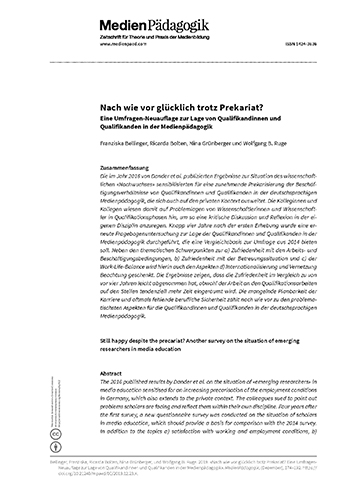Abstract
The 2016 published results by Dander et al. on the situation of «emerging researchers» in media education sensitised for an increasing precarisation of the employment conditions in Germany, which also extends to the private context. The colleagues sued to point out problems scholars are facing and reflect them within their own discipline. Four years after the first survey, a new questionnaire survey was conducted on the situation of scholars in media education, which should provide a basis for comparison with the 2014 survey. In addition to the topics a) satisfaction with working and employment conditions, b) satisfaction with the care situation and c) work-life balance, attention is also paid here to the aspects d) internationalization and networking. The results indicate that the satisfaction has declined slightly compared to four years ago, although more time is being devoted to the work on the qualification within their employment contracts. The lack of predictability of the career and lack of occupational safety is still one of the most problematic aspects for scholars in German-speaking media education.
References
Allmendinger, Jutta, Kerstin Jahn, Markus Promberger, Brigitte Schels, und Stefan Stuth. 2018. «Prekäre Beschäftigung und unsichere Haushaltslagen im Lebensverlauf: Gibt es in Deutschland ein verfestigtes Prekariat?». WSI-Mitteilungen 71 (4): 259–69. https://doi.org/10.5771/0342-300X-2018-4-259.
Blasse, Nina, und Doris Wittek. 2014. «Die Situation des wissenschaftlichen ‚Nachwuchses‘ im Fach Erziehungswissenschaft – 2014 revisited». Erziehungswissenschaft 25 (1): 59–72. https://doi.org/10.3224/ezw.v25i1.19144.
Dander, Valentin, Franco Rau, Patrick Bettinger, Sandra Aßmann, und Melanie Abendschein. 2016. «Prekär, aber glücklich? Wissenschaftlicher ‹Nachwuchs› in der Medienpädagogik». MedienPädagogik: Zeitschrift für Theorie und Praxis der Medienbildung, 1–19. https://doi.org/10.21240/mpaed/26/2016.07.13.X.
Konsortium Bundesbericht Wissenschaftlicher Nachwuchs – KBWN. 2017. Bundesbericht Wissenschaftlicher Nachwuchs 2017: Statistische Daten und Forschungsbefunde zu Promovierenden und Promovierten in Deutschland. Bielefeld: W. Bertelsmann Verlag. http://www.oapen.org/search?identifier=640942.
Kreckel, Reinhard. 2016. «Zur Lage des wissenschaftlichen Nachwuchses an Universitäten: Deutschland im Vergleich mit Frankreich, England, den USA und Österreich». Beiträge zur Hochschulforschung 38 (1-2): 12–40. https://www.bzh.bayern.de/fileadmin/news_import/1-2-2016-Kreckel.pdf.
Kuckartz, Udo. 2012. Qualitative Inhaltsanalyse: Methoden, Praxis, Computerunterstützung. Grundlagentexte Methoden. Weinheim, Basel: Beltz Juventa.
Pechar, Hans. 2017. «Karriereoptionen und Arbeitsbedingungen für das akademische Personal – Aktuelle Entwicklungen und Herausforderungen für die Zukunft». In Zukunft und Aufgaben der Hochschulen: Digitalisierung – Internationalisierung – Differenzierung, herausgegeben vom Rat für Forschung und Technologieentwicklung, 191–204. Wien: LIT.

